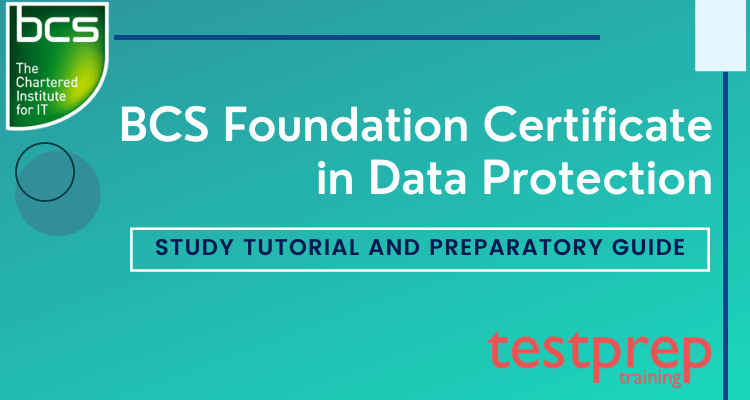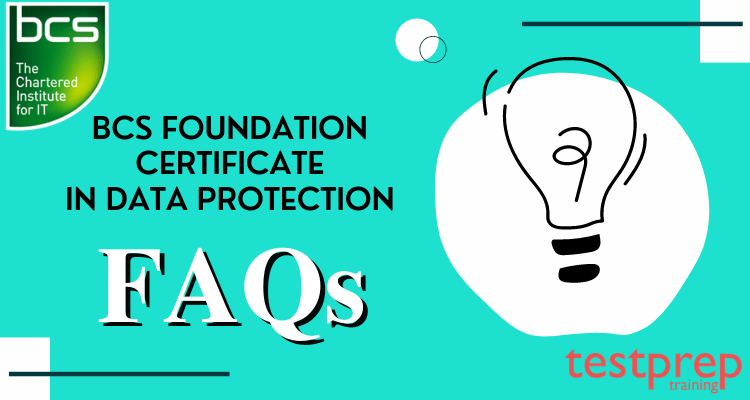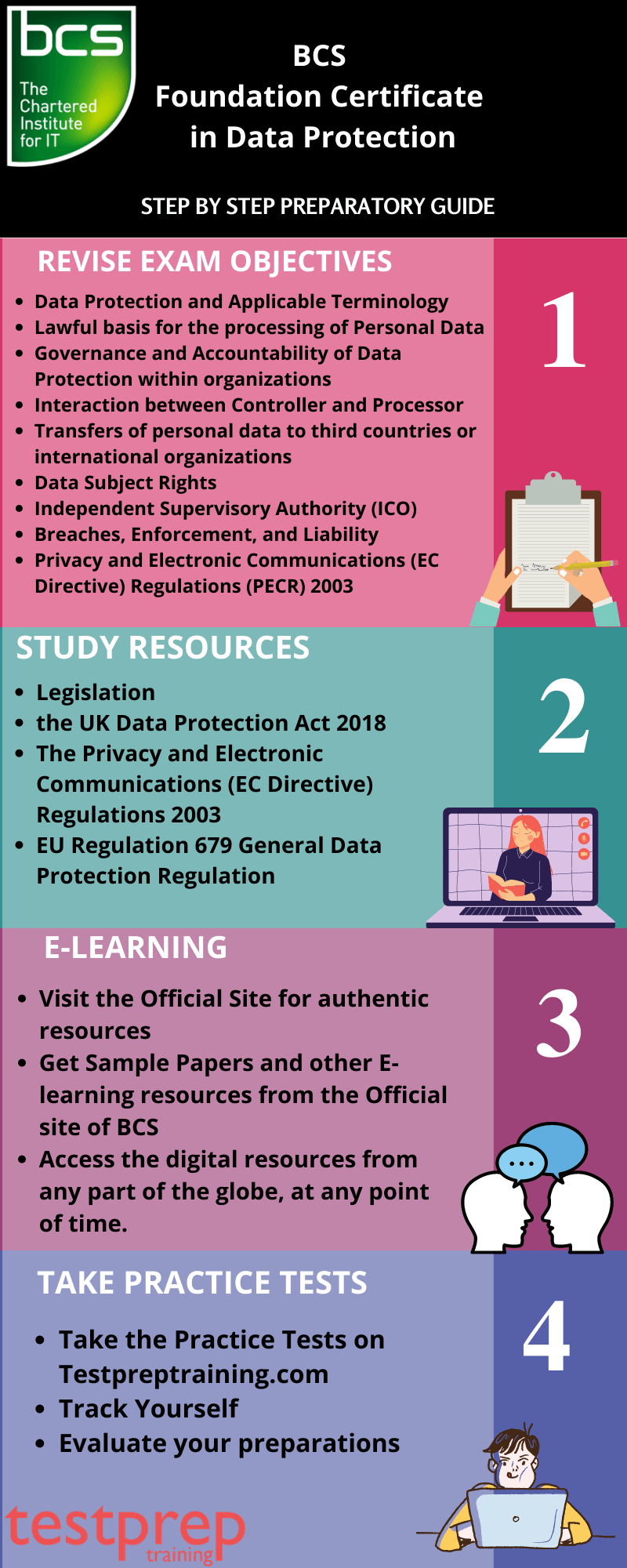BCS Foundation Certificate in Data Protection

BCS Foundation Certificate in Data Protection provides the knowledge of UK data protection law, where it spans the range of the EU General Data Protection Regulation (GDPR) and the UK Data Protection Act 2018, along with it includes an understanding of how such data protection laws are applied practically, this is also important for any organization processing personal information.
The BCS Foundation Certificate in Data Protection is beneficial for those who want to have a command and knowledge in the field of the law and its practical application. The syllabus is a little bit updated to October 2020, because an agreement was not approved between the UK and EU which results in the updated version of the syllabus inOctober 2020.
Exam information
- Exam Name: BCS Foundation Certificate in Data Protection
- Number of questions: 40
- Time limit: 60 minutes
- Format: multiple-choice questions
- The language offered: English
- Passing score: 65%
- Exam price: $100 approx
Who should take this certification?
This certification can be attempted by Marketing and sales professionals,Customer support and service delivery team members and IT Security and Information Security specialists,Corporate IT and HR teams along with project managers. Professionals who wish to strengthen their CV’s can attain this certification exam.
For more details visit BCS Foundation Certificate in Data Protection FAQ

Course Outline
An Introduction to the History of Data Protection in the U.K
Demonstrate an awareness around personal data rights in the EU and the UK
Recognize the territorial scope and jurisdiction of the GDPR (Articles 2 and 3): specifically, the following:
- Main establishment and the one-stop-shop
- When an EU representative is needed
Principles of Data Protection and Applicable Terminology
Define the following key items of terminology:
- Personal data and special category personal data
- Pseudonymization
- Criminal Offence Data (Article 10/Section 10 & 11 – recitals about)
- Biometric Data
- Processing
- Controller
- Processor.
- Data Subject
- Profiling
Describe the following Data Protection Principles:
- Lawfulness, Fairness, and Transparency
- Purpose Limitation
- Data minimization
- Accuracy
- Storage limitation
- Integrity and confidentiality
- Responsibility for Accountability with the above principles (referred to as Accountability Principle)
Lawful basis for the processing of Personal Data
- Explain the lawful basis to process Personal Data listed under (Article 6) of the GDPR and as displayed below:
- Consent
- Contract
- Legal obligation
- Vital interests
- Public interest task
- Legitimate interests
- Describe the conditions for processing special category data and the exemptions
Governance and Accountability of Data Protection within organizations
- Firstly, Identify the accountability obligations (Article 5 (2) and Article 24)
- Secondly, Describe the purpose of a Data Protection Impact Assessment (DPIA)
- Thirdly, Explain the process of conducting a DPIA
- Then, Identify the importance of keeping a record of processing activity (Article 30)
- Further, Outline the interplay with privacy notices (Article 13 & 14)
- Also, Demonstrate how to adopt data protection by design and by default approach (Article 25)
- Furthermore, Identify suitable information security measures (Article 32)
- And lastly, Explain the designation, position, and tasks of the Data Protection Officer (DPO) (Article 37
Interaction between Controller and Processor
- Identify the following controller and processor obligations
- Controller obligations (Article 24)
- Joint controllers (Article 26)
- Processor obligations (Article 28)
- Processing under the authority of a Controller or Processor (Article 29)
Transfers of personal data to third countries or international organizations
Recognize the general principles for transferring personal data to third countries, based on the most common forms:
- An adequacy decision by the EU
- Appropriate safeguards
- Standard Contractual Clauses
- Schrems II
- Binding Corporate Rules
Data Subject Rights
- Explain the key rights granted to individuals (Articles 12 to 17 and 21 to 22).
- Define restrictions that may affect data subject rights however they are not expected to have a detailed knowledge of these restrictions (Article 23).
Independent Supervisory Authority (ICO)
Explain the role of the ICO
- As a regulator
- Investigation and correction (Article 58)
- Enforcement of regulations
- As a body that creates guidance and codes of practice
- In cooperation with other supervisory authorities
- Driving forward good privacy practice in their jurisdictions and also internationally
Breaches, Enforcement, and Liability
Explain when the obligation arises to report breaches of personal data (Articles 33 & 34)
Identify the sanctions that could be imposed as a result of a personal data breach or data protection complaint.
Describe the following liabilities:
- Compensation towards the data subject
- Liability between controller and processor
- Awareness of the existence of criminal liability regarding breaches under:
Privacy and Electronic Communications (EC Directive) Regulations (PECR) 2003
Identify the relationship between the PECR and the GDPR, including the PECR’s
How to register?
- Select “create account”on the BCS Landing Page.
- Enter your email address and your basic demographic information such as name,address,number, etc.
- Go to the BCS page
- Sign-in into the account
- Choose your exam
- Select your testing location
- Schedule a date and time for testing
- Complete payment procedure
Preparatory guide for BCS Foundation Certificate in Data Protection
You need a planning guide or study guide that lists all the necessary tools to follow the right roadmap to your success, which indicates the right steps. Hard work is important, but make sure you use the required tools to put your efforts in the right direction, so always support a preparation guide that has quality information listed in it before the test.

Review Exam Objectives
Avoid burdening yourself with unnecessary resources and go step by step for the best planning. During the learning process for the test, an exam applicant should always be educated on what topics he/she might learn. This helps in the proper planning and execution of preparation strategies. Also, it keeps your efforts streamlined and targeted towards achieving the goal.
These are the following areas where the BCS Foundation Certificate in Data Protection provides you the best exposure :
- Firstly, to learn about An Introduction to the History of Data Protection in the U.K
- Secondly, to learn about the Principles of Data Protection and Applicable Terminology
- Thirdly, to learn about Lawful basis for the processing of Personal Data
- Further, to learn about Governance and Accountability of Data Protection within organizations
- Also, to learn about the Interaction between Controller and Processor
- Then, to learn about Transfers of personal data to third countries or international organizations
- Lastly, to learn about Data Subject Rights
Study Resources
BCS Foundation Certificate in Data Protection provides sample papers and also study material on their site. When you are done with the registration process of the above exam then you will be able to reach the official page for BCS Foundation Certificate in Data Protection where you will be already logged in and there you need to scroll down and click on the downloads. When you scroll down you will get all the information regarding guidance, papers,format,structure,scoring,handbooks, and also pdf for reading your course syllabus which helps you to succeed in the BCS Foundation Certificate in Data Protection Examination.
Reference Links
- Firstly, Legislation
- Secondly, the UK Data Protection Act 2018
- Thirdly, The Privacy and Electronic Communications (EC Directive) Regulations 2003
- Also, EU Regulation 679 General Data Protection Regulation
- And lastly, the Data Protection, Privacy, and Electronic Communications (Amendments, etc) (EU Exit) Regulations 2019
E-learning
E-learning and study materials are the third source of self-reliant preparation. This is essential because it gives you instant information without wasting any time on any queries you have and makes things easy for you. Different online learning environments are effective and time-efficient. E-learning provides you with updated information. Study materials provide notes that are required during preparation, which are created by niche professionals. Therefore, refer to the availability of study material always.
Evaluate yourself with Practice Test
Practice tests are intended to test your knowledge before you go for the actual test. It is the last step of your preparations. Taking the practice test is essential to take check yourself and screen out the inadequacies. At this point, you can check the zones where you need to invest the additional exertion. Practice tests are useful in self-assessment. Likewise, these tests give you an encounter of the test, and you can utilize this to deal with your time while endeavouring the real test. In this way, it is essential to give numerous training tests for both self-assessment and experience. You can enrol yourself for a free practice test at testpreptraining.com. Thus, pick up the pace, go for a training test today to know where you remain with your endeavours to get affirmed.

